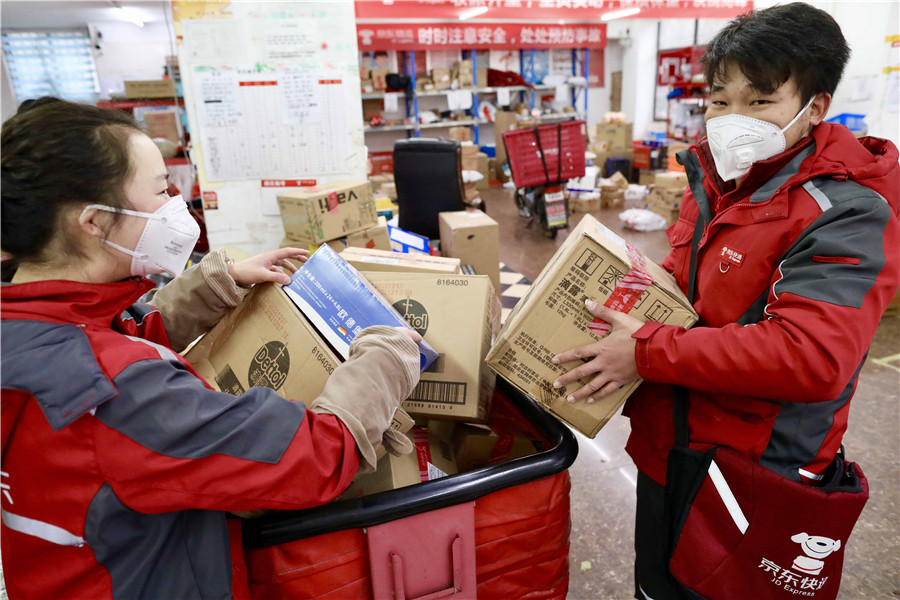Internet firms pit tech against pathogens


Chinese internet-based businesses are pulling out all the stops to contribute big money, donations, medical supplies, equipment, technologies, expertise and innovations to help combat the novel coronavirus.
E-commerce giant Alibaba Group has launched a global direct sourcing platform to expedite the delivery of medical supplies directly to Wuhan, the epicenter of the outbreak, and other epidemic-stricken areas.
The platform serves as a network, informing sellers of medical supplies and their products with the needs of affected hospitals and local authorities, the company said.
On Jan 25, Alibaba announced it had set up a special fund of 1 billion yuan ($143 million) for medical supplies. The fund will be used to purchase medical equipment and medicine from home and abroad, and deliver to Wuhan.
Jack Ma, founder of Alibaba has also donated 100 million yuan through his charitable foundation to help find a vaccine for the novel coronavirus.
Following the launch of the 300 million yuan outbreak response fund and the 200 million yuan fund to assist developers in providing technical support, Tencent Holdings Ltd added another 1 billion yuan to a special fund for the epidemic control on Feb 7, totaling 1.5 billion yuan so far.
The fund will be deployed for purposes such as procurement of medical supplies, provision of technical support, reward for the people who contribute to the battle, assistance for the infected and their families, research and development of anti-virus solutions, and improvement of medical facilities.
"With novel coronavirus pneumonia plaguing China and other countries across the globe, numerous front-line contributors commit themselves to the battle to help and save those who are suffering from the disease and protect more people from infection," said Leon Guo, senior vice-president of Tencent and chairman of the Tencent Charity Foundation.
"The extraordinary efforts made by the seemingly ordinary people are empowering us to play our part in the battle, giving us the confidence to win the battle," Guo said.
Chinese e-commerce giant JD has mobilized its resources across the company, from retail, logistics, technology to health and other departments or wings, to provide immediate support for the anti-virus fight.
This includes initiatives like launching robot and drone deliveries to address last-mile delivery challenges during this period; implementing AI technology to provide instant support on queries related to the epidemic; providing free health consultation with top doctors across the country; and ensuring consumers' needs for food, epidemic prevention supplies and other daily necessities are met.
JD has allocated 1 billion yuan to support the fight against the novel coronavirus outbreak. Funds cover the donation of health and safety protection equipment and medical supplies, logistics costs to Hubei province and the daily supply of necessities to places that are most affected by the epidemic.
JD Logistics, the logistics arm of JD, started to provide delivery of medicine to local pharmaceutical companies in Hubei province on Jan 21. Leveraging JD Logistics' supply chain capabilities and technology, the unit had delivered over 1,600 tons of epidemic prevention materials and necessities from all over the country to Wuhan and surrounding areas as of Feb 6.
Moreover, JD has mobilized to put its autonomous delivery robot technology to work in Wuhan. Its autonomous delivery robot successfully made its first delivery in the city on Feb 6. The robot departed from JD's Renhe delivery station and delivered products to Wuhan Ninth Hospital, which is the designated hospital for the treatment of the novel coronavirus pneumonia in Wuhan.
"JD autonomous delivery robots can help reduce human-to-human contact, making them an ideal solution for last-mile delivery solution in Wuhan during this unique time, protecting both our customers and our employees," said Kong Qi, head of autonomous driving at JD Logistics.
Internet search giant Baidu Inc announced the establishment of a 300 million yuan special fund to support virus control and prevention, while promoting long-term public health education and security.
In addition, Baidu Maps enables the public to check the density of people in public places, including business areas, hospitals, and transport hubs, to prevent potential exposure risk to the virus.
It also developed an AI-powered, contactless infrared sensor system for fast, multi-person temperature monitoring, which is now operational in Beijing's Qinghe Railway Station.
Cao Lei, director of the China E-Commerce Research Center, said the donations from major tech enterprises embody their social responsibilities and have positive social impact, as the novel coronavirus spreads throughout the country and concerns everyone.




































